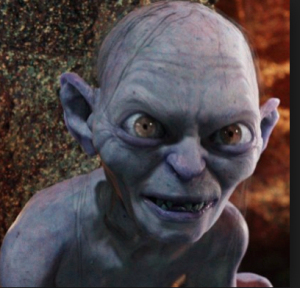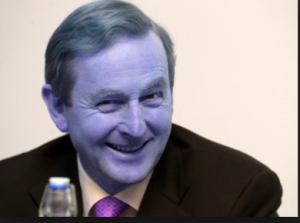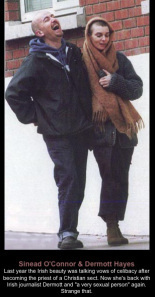Dermott Hayes's Blog: Postcard from a Pigeon, page 84
December 28, 2014
Take me to the River��
For the past twelve months, the people of Ireland have opposed the efforts of the Irish Government to introduce metered water charges that amount to an extra or double tax (for something they pay for, already). They’ve opposed the installation of meters in their own communities and on their own doorsteps, often with violent results and arrests, as the Irish police force has been engaged in the dubious role of protecting the meter installers against the public protests. They’ve also opposed the water tax with massive, nationwide protest marches.On one of these, in Dublin, some of the marchers assembled at Islandbridge, on the western end of the river Liffey that divides the city in two, with a plan to march along the riverside and join the other marchers at O’Connell bridge. Marchers were encouraged to wear blue clothes on the day to give the aerial impression of a river of protest in flow. The idea prompted me to write this poem, Take me to the River��.
By Dermott Hayes
Take me to the river
let me march
in a stream
of righteous anger,
powered by
a current of
indignation,
to say,
too far,
no further
to those who
would rob me
of my birthright,
my democratic
right,
my Constitutional
right,
to fight
for my right
to flow

December 27, 2014
City of Thoughts
City of Thoughts��
By Dermott Hayes
In my mind
the world is
a City of Thoughts
where I can wander
undisturbed,
window shop
in a world of words,
sightsee cityscapes
of thoughtful wonder,
feast in restaurants
of Epicurian splendour
and drink in bars
with bottomless glasses,
wine that is the nectar
of Creation
But no- one talks
no-one listens
nobody sees
the thoughtful pavements,
or wanders
with me
in the avenues of wonder,
like the blind poet
singing songs
for the deaf

December 26, 2014
Social fretworking
Social fretworking��
By Dermott Hayes
I posted a thought,
it flew away
through dark, cavernous
cyberways,
to bump and grind
with other lonesome thoughts,
in the hotbeds of social fretworks
and worried then,
where it might go,
unguided, misunderstood,
to liaise, frolic and fret,
argue, debate,
opinionate
in a world of posts,
untethered,
away from me
gone, awaiting its return,
alone.

December 17, 2014
Poem for Christmas�� by Dermott Hayes
Poem for Christmas��
By Dermott Hayes
I wandered,
lonely,
in a crowd,
Amid bells of
Christmas cheer,
the glug
of festive beer,
suburban commuters
hustling home,
minds crammed
with lists and bills,
beggars��� eyes,
homeless spirits,
freezing,
pleading,
���see me’.
A touch,
a bump,
a smile,
a ���sorry���,
carol singers
deck the halls
with holly.
In this breakneck
world
of ker-ching
and instant message,
is it really
just the lonely
feel the sting
of isolation
in an orgy
of everything?��

December 10, 2014
History Lesson��
foreword…On the morning of December 10, 2014, when the people of Ireland are poised to express their very vocal disgust and protest at the introduction of water charges but, even more importantly, their outrage at this Government’s mismanagement and complete disdain and disregard for the democratic will of the people, I publish this poem, History Lesson, inspired by a conversation with my father, Martin Hayes, who was born in 1922, the year of the birth of this nation.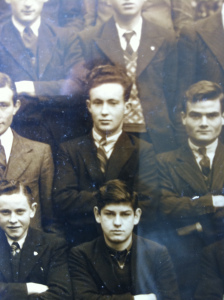
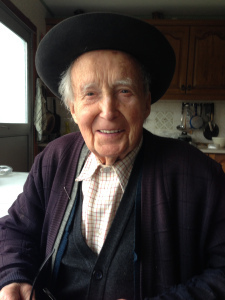
Martin Hayes
History Lesson��
by Dermott Hayes��
Born at the birth of a nation
in poverty and hope
a new dawn with brooding clouds
broken families
rent by spilled blood and hate
The manifesto of their origins
written in their history
but hidden in their childhood
but that is written by the victors
what did they win?
and who won?
Early memories
on a country road
a man spilling blood
cycling the lanes
a gun hanging from his crippled shoulder
and fireside stories told
of women hiding bombs in kettles
to fool the ���Tans
and her man who vowed
to die with a hot gun
in his hands
their son
who walked those same country lanes
would later visit their graves
their final resting place
under the shade of an ancient oak
in a government car
and their history forgotten,
manipulated, distorted,
revised and rewritten
while our son of the nation
took his education
but learned his history at home
in fireside tales
of perfidious foes
and fearless heroes
then when the other side
stepped to the plate
to take their part
in building the state
in their own shape
they went to war
an economic war
a flea biting a sick, old dog
and a farmer couldn���t sell a cow
but slaughtered them and their calves
and sold their hides
while their families fled
or starved for pride
Then the dog awoke
Not for fear of a flea
but anger at a pup
it had once subdued
should become a snarling beast
It was time for many sons of this nation
to seek their fortunes, again
in the bloody fields of conflict
for what were their choices
no work, no wealth
no history, little purpose
By chance
our son was presented with a choice
to fight and die on foreign soil
or live and work
to serve the nation
his motherland
then public service
was an honourable duty
with little pay and few rewards
but with a classic education
well versed in Greek and Latin
and a memory packed with rhyme
of Wordsworth, Goldsmith, Milton
and the glorious bard
he sustained the lonely vigils
on a border of two nations
his own history told him
should be one
for what he knew of his nation���s birth
was nurtured in the warm heat of the fireside
a story of a history stolen and divided
but by who and why
was never clear
until once he stepped inside the GPO
a grown, young man
to walk in the footsteps of those who died
to give their nation
its first breath of life
and he read their words
addressed to Irishmen and Irishwomen
and spoke of cherishing all the children
It caused him to pause and think
of who had won what and to what end?
We stood together
when the ribbon was cut
to open a link between north and south
the new Lifford bridge
replaced the old stone crossing
battered, worn and dangerous
by the fast flowing waters
of Finn and Mourne,
a bridge built in co-operation
by the Councils on either side,
on that day,
beside Neil Blaney and Captain O���Neill,
we stood and I wondered
where were the cloven hooves
and Lambeg drums?
but their beat could always be heard
lest we forget
on the ���free State��� side of the border
On visits to Strabane or Derry
Neighbouring towns of another state
That would soon explode
As a suppressed minority
Sought to loosen the shackles
In a world awakening to
Civil rights, teetering on revolution
While at home
The men in shiny, mohair suits
Looked slick, smart and sleek
So that, dazzled by their brilliance,
We failed to see their sleveen deviance
While they stripped
Fat and lean
Off country, city, town
To line their pockets
And reward their skill
To pull a three card trick
And make us all
Their grateful fools
join us then
new Europeans
and another fat teat
for this wailing, needy child
to suck on
while Northern Ireland and its troubles
become the prism and kaleidoscope
through which our deeds are seen
and what begins as defence
becomes a relentless tit for tat war
where no ground is gained
nor battles fought
but still the bodies mounted
in a war that blurred the lines
between criminal and crime
on either side
and drew the gangster and the deviant
to fight alongside self confessed
and, by their own estimation,
misunderstood patriots,
who like the heroes in the lore
were the ones who died
for a cause they no long understood
because they couldn���t find an answer
and so they fought and fought and fought
until, far from knowing the purpose of their actions,
they didn���t understand the question
and the south adopted a policy
of implausible deniability
pretending if it can���t be seen
then it doesn���t exist
a ploy that���s never worked with children
Albert, for all his faults
called time and Enough
It���s time to grow up
But a nation grows with its people
And writes its own history
By deed, thought and act
So while a country’s colonised
By rule of law
That country’s irrepressible impulse
To express itself
Turns colonist of word and language
First Swift, then Goldsmith,
Then Wilde and Yeats
Before the torrent of a borrowed language
From a downcast race
Breathes new life into a suffocating space
Joyce, Beckett and Shaw
And from their lead
New voices roar
Clarke, McNiece
Stephens and Gogarty, too
And from the working classes
Voices that were ignored
Locked out
In the rush for the gold
Of nationalist lore
O’Casey and Behan
Inspired by Connolly and Larkin’s struggles
And still, within our time, most recent
Stand Flann O’Brien, William Trevor,
McGahern and Seamus Heaney
Or Roddy Doyle, Sebastian Barry
Van Morrison, U2 and Sinead O���Connor
Christy Moore and Christie Hennessy
The Dubliners and The Fureys
The Wolfe Tones and The Clancy Brothers
The Pogues, Thin Lizzy and The Stars of Heaven
Boyzone, Westlife and One Direction
Names are just a few
All hail a diversity, uncontainable
Within the confines of a history
Written by reactionary revisionists
Or shackled by the empire of thought and action
the Holy Roman Mother Church
this is a world of the fast moving message
Media that once were in the confines
of science fiction
in a thrice became commonplace
and a global concert of musicians
led by an Irishman
wakened a world to its own deprivations
Filmmakers from Raoul Walsh to Ford,
Sheridan and Jordan,
Stars shining bright in the celluloid firmament
from Cagney, Pat O���Brien, Maureen O���Hara
and others to the present day of Farrell, Gillen
and Saoirse Ronan
How could we not change and changing,
change the world we live in?
though while we changed
the world we lived in
was far beyond the pale
pallor of the land we lived in
for what happens when the leaders die
the visionaries who could see the light
of a land of equals
free and proud,
Carrion���s pecking order
comes forth to stake their claim
and rip the throat
to quell the voice within,
steal the eyes
so they can���t see
the howling jackals feeding
on the carcass of the hero
while their greatest crime
becomes their greatest failing
the immolation of imagination
they climbed in a mirror
and became their own oppressor
Sought, like a wounded cur,
the comfort of an angry voice,
a swinging cudgel,
To kowtow to bankers and bondholders
and bury their own
under a pile of seething debt,
while pawning the family jewels
and natural resources
like oil, gas and water
for a derisible pittance,
they build a spire
like a spike
a monument to their delusion
a chimera of misapprehension
while the forgotten children
abused, discarded, disavowed
redundant and downsized
the surplus to their needs
lie dead in the streets
that are paved with those spikes
the symbol their own
sickening fantasy
And now,
within a decade of the centennial
of his own birth
and the birth of that nation he had served
he wonders again
as tax is piled upon tax
whose history was it for
that it should be sold and washed away
relinquished like some redundant lease
a mortgage in default
a payment short of foreclosure,
before the freedom it promised
could be cherished
by its sons and daughters?��

December 3, 2014
TITO’S DEAD but I’m alive
TITO’S DEAD and I’m alive
Three years ago, October 2011, I posted the eighth chapter of Tito’s Dead a novel I began writing in 2004, finished in 2005 and put aside then, for the best part of six years, in Splinter4All, a writers’ website to which I contribute.
Then, following occasionally haranguing encouragement from a dear friend, Eamon O’Connor, I dug it out of its shoebox home and began a meticulous rewrite. After Eamon died, quite suddenly, on September 3 last year (2013), after a brief illness, I vowed to finish the book and see it published.
So I set to work, reading, re-reading, writing, rewriting, until I felt it was finished. Then I dispatched it to a select group of critical readers, each with their own unique viewpoint and geographical location and asked them to have at it, with pen, pencil or axe. One of those, a keen reader and a tour manager with a world famous heavy metal rock band, sent me back heavily annotated copy in batches of five to ten pages, at a time, by email, a copy proofer who could pick nits off a nitpicker. Another, a former Eastenders actress, gave me an insight to my characters’ flaws and accessibilities and another, an active policeman, gave me an insight to, well, police, and how they work. Along with them, there was a psychic in Spain, an accountant in Philadelphia, a lawyer in Italy and an inventor in Florida. Oh, and a paraplegic graphic designer in Dublin.
This was how I tackled the task of editing the book, since I couldn’t afford a freelance editor or proofreader. All of these people were recruited by me but their services were given, voluntarily. And believe me, they were vital to the process.
The next step was designing the cover. Now, I’m a keen amateur photographer but I haven’t had a decent camera for many years and have to rely, instead, on my trusty iPhone. So both pictures for the cover and back of my book were taken with an iPhone. as for choice of location, well, Tito’s Dead begins with the death of Tito, down a dark, wet, lonely laneway in Sarajevo…see if you can guess the location.
The next step was the actual design and again, the biggest problem was the cost factor. Other problems arise, too, once you decide to ‘design’ your own book. You worry about how many books get left on shelves because they didn’t scream, beseechingly, enticingly,intriguingly, at the casual bookshop browser, READ ME. And then you start to worry about the cost, again. So you study book covers, thousands of them. You begin to dream in thumbnails. I found a free iPad app called Publisher so that solved the design cost problem.
Then I decided to employ Facebook in my quest. I posted two proposed covers and invited comments. For three weeks I was inundated by suggestions, critiques, new designs and offers of help from artists and designers. It was a roaring success because a) it gave the book’s impending publication some free exposure and b) it raised expectations and anticipations.
That is the only the start of it, though, because without the marketing budget and contacts of a professional publishing house, getting your book out and into the hands of influential people, is an uphill struggle.
And in my hurry to get the book out, I missed one other trick employed by digital self publishers. Get your book on a pre-order list with whatever retail sites (iBooks, Amazon, Barnes and Noble, Sony) you are using. Then recruit your friends, family and exhaust your complete list of phone, email and old school friends, asking them to ‘pre-order’ a copy of your book, starting three weeks before its scheduled publication. They don’t have to buy the book but these ‘pre-orders’ are registered as ‘sales’ and can put your book on a best selling list, the very list that could prompt others to follow their lead and keep you there, for real.
Another issue about self publishing is whether to print or not. Speak to people, in general, and they’ll say, ‘oh, there’s something about the feel of a physical book,’ while in reality, avid readers, these days, will, almost inevitably, have a Kindle or an iPad or some other tablet or e-reader. Printing books is not cheap. But help was at hand. Amazon have a service offered by a sister company, called CreateSpace that allows you to design your own book for print, for free, which is then available, from Amazon, on a print to order basis. And you can buy them, yourself, from Amazon, at cost price.
So, after launching the digital edition of TITO’S DEAD, in April with little or no fanfare, I launched the printed version at the end of October 2014, in Philo’s Bar, Bruxelles and managed to sell 120 copies of the book, that night. Since then I’ve been selling a copy here, a copy there but it’s early days, yet, and if anyone wants me in Splinter4All, I’ll be happy to accommodate you. Digital copies can be bought direct, from my website where there’s a special 2 for 1 offer, right now.TITO’S DEAD
https://dermotthayes.com/Titos_Dead/SPECIAL_OFFER.html

November 6, 2014
Same old story…
Leo Varadker has mentioned ‘sinister fringes’, Enda Kenny keeps talking about ‘some people who won’t pay for anything’, like a disapproving and scolding headmistress but it was Victoria White’s opinion piece in the Irish Examiner that puts a voice on and a face on the latest scapegoat, the Reds. They’re everywhere, of course; on the picket line, in the Dail, in the meedja, under the bed and what’s all this crack about ‘red beer’, oh, they’re crafty, too.
Y’see, they’ve found something with which to whip the Government and oust them from power, just like they did with Thatcher’s poll tax, and it’s water. But that’s immaterial. It could be dog shit, if it would help them bring down a Government and help them gain power.
I can’t dispel the image of Gollum and his ‘precious’, when I mention ‘power’ and our incumbent Government. Because that, is what they want to hold on to and fear losing. Paranoia is now deep seated in the Government and the governing parties. You’ve only got to look at the stream of threats and cajoling offers that have come out of them in the past month, since the first march put the fear of people power in them.
Enda Kenny’s offer to ‘give people clarity’ is risible and about as clear as mud in an estuary at low tide. Firstly, why could they not have given such clarity when they began this whole, sorry, debacle. Why was there minimal debate on the water bill? Why was a private company set up and at such expense? Why does said private company need access to PPS numbers and how come that appears to have been lost in the current debate? Why should water be so expensive?
No-one disagrees that water is a vital resource. No-one disagrees that the water system we have is inadequate. Everyone wishes it were better. But handing it to a private company, State controlled or not, is not the answer. Everyone, but the Government appears to agree to that.
That private company will be able to borrow money for infrastructure, off the Government’s balance sheet, they argue. What? Off the balance sheet of a country that has bailed out the European banking system and its private, foreign bondholders? A country that by recent estimates, is recovering faster than any other European economy, even if its citizens are paying, daily, out of their wage packets, a charge for a debt that was never theirs, in the first place? No-one will give us a loan to improve our infrastructure that could make this country an even more attractive investment prospect than it already is? Damn, I just didn’t see that.
So, it has nothing to do with the fact that people are strapped to the bare essentials, if they’re lucky; clinging to a leaking ship by their fingernails, if they’re like almost everyone or fed up being whipped, robbed, ignored, patronized, pushed and bullied by the Government they elected and their uniformed lackeys? And it has nothing to do with the tax heaped upon tax over a succession of years that was purportedly levied to pay for water, but like many manipulated waterways, was diverted in other directions until now, the dam has burst and the water shambles flooding in its wake, must be paid for by, yes, you guessed it, us, the people of Ireland? Why did no-one explain it to me like this before?
Now I see, it’s all become clear. Ah, the clarity, like the time they cut the trees down on O’Connell St and Dubliners took to singing, ‘I Can See Clery’s Now, the Trees Are Gone’.
So, maybe I’ve been bamboozled, bothered and bewildered; turned every which way around by them crafty reds. And I don’t mean the beers. I mean the Commies. They’re after our power, our Precious-s-s-s.


October 13, 2014
water charges, being an artist and who’s listening
So I went out for a drink the other night with a friend of mine, a very successful person in his own business, with all the accompanying problems related to a successful, independent business in this country and he says to me, ‘water charges will come in, it’s the way it is, Irish people are like sheep, they’ll go wherever they’re herded.’
And I said, no, that’s not true and it’s his kind of negative thinking that the authorities rely on and the people, without any notion of hope, will believe.
One month ago, an English friend of mine who pays for her water to a private company, opined that it might not be such a bad thing to have metered water supply, as her own water supply was from a private water company. I replied, Were that it were as simple affair as paying water rates to a public authority, Lizzie, there wouldn’t be half as much trouble. Our water supply system is antiquated and, despite the taxes and rates paid in the past, it has been allowed to deteriorate so that water in many areas is undrinkable and there is an appalling level of waste. As if that weren’t enough, while bailing out Europe from bank debt, the Irish taxpayer is now being asked to surrender, under law, vital private information, to a privately owned, independent company who will then have exclusive, monopolistic access to our water supply that they will dish out through metered pipelines.Now, apart from anything else this creates the horror of our water system being sold to corporate interests, of which there is more than adequate international precedent.
And these are not like your old style gas or electric meter. You won’t be able to turn them off. Instead, it will measure your consumption and then demand payment. And, as if that weren’t enough, they’ve turned the Irish police force into what is effectively a private security firm in such an alienating fashion, it borders on the kind of totalitarian tool that could only be conjured by Huxley, in a nightmare. The media, meanwhile, are cowed and silenced by the Government and their shareholders with vested interests in the success of Irish Water Inc.
Since I wrote that, there have been countless public and nationwide, often physical, protests against the installation of these meters. In the process, Irish citizens, protesting, as is their expressed constitutional right, have been harassed and often arrested, under the, often dubiously speculative application of, the Public Order Act, while the Garda Siochana, the so called Guardians of the Peace have been perceived and seen to act as a private security company for the water meter installation company, GMC Sierra, whose employees are operating on an installation incentive of €25 each, per metre installed.
Now, you have to consider the ownership of the company employed to install the meters, GMC Sierra. It is owned by Siteserv, a company that is, in turn owned by Millington, an investment company owned by billionaire investor, Denis O’Brien. And all that might not be so strange, unless you consider the deafening silence, underestimation, and misreporting involved in the coverage of the whole water charges protest. It turns out Denis O’Brien’s Communicorp is the largest, single, private owner of Irish media interests. To jump from that, to say he controls the media, would be an insult to my former colleagues in the newspaper business but I’m sure they feel uncomfortable wearing muzzles.
Last weekend, in two bye elections, the Government was delivered a resounding message; water charges are on the agenda and the public’s answer is ‘no’. And if they missed that message, more than 100,000 people marched the streets of Dublin, representing and backed by far more than twice that number, and guess what their message was, yup, NO, NO, NO.
Of course, the Government, as all ruling parties do, under threat, reacted. So, one week after the deputy prime minister or ‘tanaiste’, (by now, jokingly, the leader of the so called, but with little meaning, Labour Party) expressed her outrage and apparent surprise at protesters using expensive phones to record the Irish Gardai’s use of excessive and inappropriate force; the Government, of which her party is a minor partnership member, dangled a carrot of increased allowances and tax reliefs, in a classic, and defeatist effort, to split the opposition. And still they persist in their delusion.
So, I’ll leave you with this poem I wrote, though I’m a writer, not a poet, although a friend of mine told me, Poetry is just a pungent and condensed way of using language. The difference between poetry and prose is that the words are fewer and work harder. I think that’s all happening in your poem for sure, which was kind of him. At least I can say, it was written in rage and with all my heart.
So here it is,
The true cost?
Bums in the air,
knees on the tiles,
crying bitterly
through our worn smiles;
laugh? I cried,
how much? I smiled
and then paid
while they fucked me
with taxes for bankers,
and then nothing,
not even our rivers,
run free


September 4, 2014
Don’t follow leaders…
A review of James Lee Burke’s Light of the World
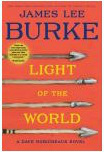
Ok, there are patterns that repeat themselves in the books of James Lee Burke, who carries a stock company of character actors, like film director, John Ford, who occupy, colour and drive his stories.
First, there’s Dave Robicheaux, the main protagonist in the twenty strong Robicheaux series. He’s a flawed but principled character whose life has taken its tumbles, some self imposed, some cruelly circumstantial.
Then there’s Clete Purcel, his one time partner in NOPD Homicide and his lifelong friend; another flawed character with a heart of gold who is, in many ways, Robicheaux’s untamed alter ego.
Other characters populate their lives and their adventures; Dave’s wives, who are invariably strong willed women; Alafair, his adopted daughter whom he rescued from a crashed aeroplane, Batist, his uneducated black, Cajun bait shop helper and, of course, Tripod, the three legged coon.
More recently, as the main characters have aged, new characters have emerged, most particularly, Clete’s long lost daughter, Gretchen Horowitz, a complex figure with a shady past as a mob assassin who aspires for redemption as a film maker but who can never escape her past.Clete also has a penchant for chasing lost causes in the romantic stakes.
Then there’s the cast of villains, many of whom, like, for example, Wyatt Dixon, the born again Rodeo clown with a murky past, whose intentions, though distorted by a warped aspect of reality, are essentially good.
But then there are the ultra villains and these are usually psychopaths whose actions and motives defy logic and appear to embody and exude the essence of evil.
Alongside them, are the ultra rich, immoral profiteers, who will stop at nothing to destroy the earth and its resources, for the simple cause of power, glory and wealth and damn the begrudgers.
Oh, and there’s also a learned, well intentioned, intellectual, battering against the odds, to save the world around him.
Light of World finds the boys on holidays in Montana with their respective daughters, guests of an Albert Hollister, author, rancher, nature lover and eco-warrior. They soon find themselves thrown into a war against a ghost, or, at least, someone everyone believes is dead, a psycho serial murderer who appears to have Alafair in his sights.
This man, one Asa Surrette, who adopts the character and name of an ancient Roman, pursues his targets relentlessly and with unremitting cruelty. Like all good thrillers, it’s a race against time and clues are revealed, reluctantly, along the way. Of course, Surrette’s ties with the local billionaire energy moghul and his family, are some of the clues revealed along the way.
It’s not all doom, gloom and bible thumping cleanse and repent, though. There’s a fair share of humour and none, perhaps more than the revelation in the final chapters that Surrette’s primary target from the beginning. But I’ll leave that to others to discover. I couldn’t help thinking it was Burke’s own ironic exhortation to his devoted literary followers, a kind of paraphrasing of Bob Dylan when he sang, ‘don’t follow leaders, watch your parking metres.


August 24, 2014
Amazing Grace
The death of former Taoiseach Albert Reynolds recalls to mind the many times I encountered him over the years. He was a gentleman and a fair minded person but one occasion, in particular, stands out for me.
It was Christmas, 1999 and I’d been invited to a small gathering in the Reynolds’ family home on Donnybrook’s Ailesbury Road. When I got there, Albert and Kathleen were on hand to greet each visitor, personally. He asked me where was my girlfriend? and I told him she was en route from London and would come here after dropping off her luggage. Sure enough, half an hour later, a taxi deposited Sinead on the doorstep and she was dressed in her full clerical garb of black suit and priest’s collar.
As the evening progressed, some of the revellers had repaired to the front drawing room where they gathered around a baby grand piano and sang Christmas songs. Then someone asked Sinead if she’d sing. And she did. She sang ‘Amazing Grace’ and the room fell in to an awed and stunned silence. When she finished, the silence hung, frozen, for a second. Then there was an uproar of applause.
At that point, Albert walked in, curious to see what had inspired such an outburst. I told him what had happened and he said he was sorry he missed it, before asking me if there was any chance she’s sing it again. I suggested he ask her himself. And he did. And so she sang it again.
By now the room was stuffed to the rafters but there was complete silence as she sang. Albert stood in front of the piano, staring straight at Sinead, standing to the left of the pianist, framed by a great bay window and the winter snow-light evening beyond. When she finished the song, there was the same hush in the room. Albert continued to stare at her, his own face illuminated by that same snow light reflection, his mouth open and a single tear, like a bead of light, on his cheek.


Postcard from a Pigeon
- Dermott Hayes's profile
- 4 followers



